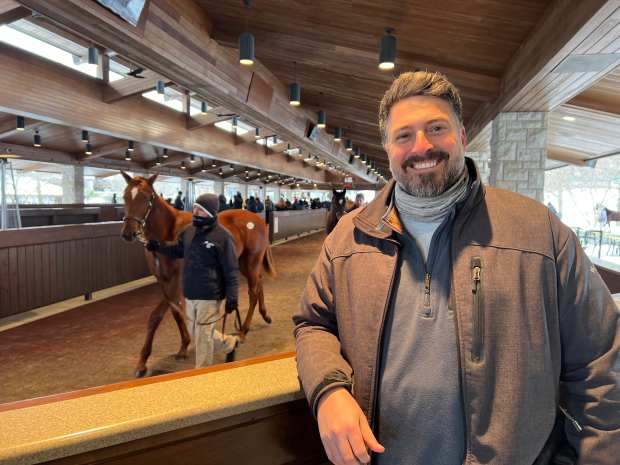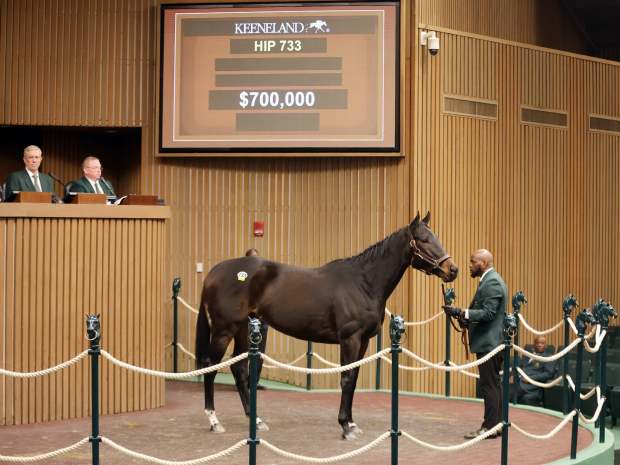Hair Testing No Help: Trainer Donald Buckner Suspended Two Years, Fined $35,000 Over Clenbuterol Positive
The Horseracing Integrity and Welfare Unit issued a final ruling in the case of trainer Donald H. Buckner on Wednesday, March 6. Buckner will serve a two-year suspension and pay fines totaling $35,000 over his trainee's positive test for the banned substance clenbuterol on June 15, 2023.
Buckner told the Paulick Report that he believes the horse, "In The Midst," was administered clenbuterol prior to the time Buckner purchased him.
"I have a private farm, and I don't even have clenbuterol on the premises, so I knew I didn't give it any," Buckner said. "I'm 80 years old, I've been running horses since I was 12, and I've never had a positive test, not even for Bute. I've never had a horse break down or be vanned off, but they take none of that into consideration."
The trainer explained that he purchased In The Midst from the Arizona stable of trainer Justin Evans in May of 2023. In The Midst had run at Turf Paradise in Phoenix, Ariz., on April 15. Evans claimed the 2019 gelding from that race for $4,000, but never ran him.
Buckner brought the horse to Thistledown for a workout on May 15, but otherwise boarded In The Midst and three other horses at a private farm in Ohio.
In The Midst first ran for Buckner as owner/trainer at Thistledown on May 23, the day after HISA's new Anti-Doping and Medication Control Program went into effect. On that date, the gelding finished third, but suffered a mild heat stroke. The distress did not put In The Midst on the vet's list, but the next time the horse ran, also at Thistledown on June 15, In The Midst was selected to go to the test barn.
The gelding finished fifth in that June 15 race, a state-bred allowance, earning $716 in purse money.
Buckner entered him back to run at Thistledown on July 21, but two hours before the race, after the gelding had already been administered Lasix, the HISA vet came to Buckner's barn and informed him his horse would be a scratch. According to Buckner, no one, not the HISA vet nor the Ohio stewards, told Buckner why his horse was a scratch, just that he had to "Call HISA."
After two hours of struggling to find information, Buckner was finally told that the horse had had a positive test for clenbuterol.
Buckner was immediately suspended, but his suspension was stayed a week later under new HISA regulations that required a B sample to return a positive test before enforcing a preliminary suspension.
A month later, Buckner's suspension was reinstated when the B sample also returned a positive result for clenbuterol. Buckner contacted HISA ombudsman Alan Foreman to ask for help.
"He was actually the first call I got when I became ombudsman," Foreman said. "He had acquired the horse several months before the race, so the belief was that potentially the horse had been treated with clenbuterol before he had him."
Foreman suggested hair testing as a possible method of exoneration.
Segmented hair testing was recently used to drop charges for a clenbuterol positive against trainer Jeffrey Englehart, when it proved the 2-year-old had received the banned substance prior to entering the trainer's care.
Read more about Englehart's case here.
Part of the problem, Buckner believes, is that clenbuterol was not a banned substance in either Ohio or Arizona prior to HISA's implementation of the ADMC program on May 23.
In Ohio, Buckner said, the generally-accepted practice was that 5cc clenbuterol was permissible five days ahead of a race.
"The threshold in Ohio was and is (now just for Standardbreds) 25 picograms per mg in plasma," said Dave Basler of the Ohio HBPA. "There are a number of factors that go into withdrawal time estimates, but anecdotally I would say that was the general consensus."
Thus, it is possible that In The Midst was legally administered clenbuterol in either Arizona or Ohio prior to the implementation of the ADMC program, but that Buckner was caught out when the rules changed on May 23.
Hair testing confirming the presence of clenbuterol was completed by the UC Davis lab in October, but it didn't show what Buckner had hoped.
"Unfortunately, the segmented hair testing did not support that theory," Foreman said.
Recommended for You
"I was told that the hair test proved the horse had clenbuterol long before I had him, but they said it didn't prove he didn't get it while I had him," said Buckner. "One expert I talked to said that since his mane is black, it holds clenbuterol a lot longer than other hair colors."
Read more about hair testing here.
HIWU initiated arbitration with Buckner on Sept. 20, and a preliminary conference call was scheduled for Nov. 13. Buckner failed to appear.
A hearing was scheduled for Dec. 20, with Buckner scheduled to provide a Pre-Hearing Brief, exhibits, schedules, witness statements, expert reports, and other evidence for his case on or before Nov. 30.
Buckner failed to provide that documentation by the deadline, and on Dec. 19, he told the arbitrator there had been a death in the family and asked for a postponement.
The hearing was rescheduled to Jan. 23.
Buckner asked for another extension, which was granted, and the hearing was rescheduled to Feb. 21.
On Jan. 16, after Buckner failed to respond to several requests for documentation, a status conference was held. Buckner told the arbitrator he had failed to supply documentation because he was trying to secure a pro-bono attorney.
Though HISA offers a pro-bono attorney program, Buckner said he did not qualify under the earnings threshold.
"This was a $10,000 horse, and I'm a little guy with four horses," he said. "Are you gonna spend $30,000 on a lawyer just to prove you're right?"
Buckner said he also hoped that the Court of Appeals would issue a ruling on the constitutionality of HISA prior to the conclusion of his case, but that ruling has yet to be issued despite a hearing occurring on Oct. 5, 2023.
Ultimately, Buckner failed to appear at the evidentiary hearing on Feb. 21, leaving the arbitrator with little choice in how to proceed.
"Under HISA rules, the onus is on the trainer to establish that he's not at fault, or that if he is at fault, it's not significant fault, or not negligent," Foreman explained.
The arbitrator wrote: "Mr. Buckner has given no explanations for the presence of Clenbuterol in the horse, In the Midst. In fact, the Arbitrator on more than five (5) occasions asked Mr. Buckner to submit a brief, exhibits, witness statements, expert reports or any evidence that he intended to rely on at the Hearing. He failed to do so on every occasion and even failed to appear at the Evidentiary Hearing."
Thus, the arbitrator ruled that:
- In The Midst would be disqualified from his fifth-place finish on June 15, and that the purse money be redistributed;
- In The Midst would be ineligible to race for 14 months (beginning June 15, 2023);
- Buckner would serve a two-year period of ineligibility beginning on July 21, 2023;
- Buckner would pay a $25,000 fine;
- and Buckner would be required to pay $10,000 of HIWU's arbitration costs.
Buckner was able to run In The Midst and one other horse at Mountaineer Park in August in West Virginia, since ongoing legal disputes mean that HISA has no jurisdiction in that state, but he said he ultimately decided to divest his horses.
In the past, the trainer might have considered going to Assiniboia Downs to race during his HISA suspension, but he said he has a daughter who will be a senior in high school next year and that he doesn't want to uproot her life.
"Probably when my daughter goes to college, I might go back there to Assiniboia, but I will never go back to another track where HISA has anything to do with it," Buckner said.
The full arbitration report against Buckner is available here:







